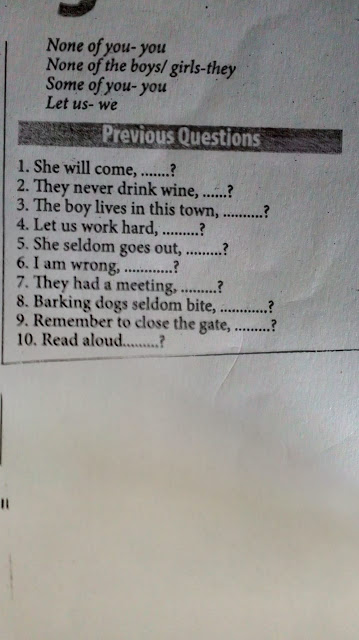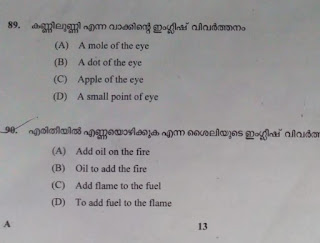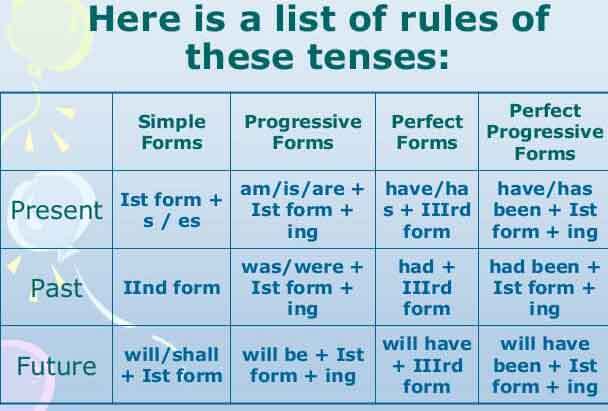Click here for a pdf file
am/is/are going to (Future)
I am going to learn code next month./ It is going to rain./The Prime Minister is visiting Maldives next month / immediate future ……today/tomorrow/ this week /next week /this month
To learn more about articles , click this page
Use of a / an
/ the – the articles
Rules :
1. “a/ an” : To
denote “any” Before countable singular
nouns ( “an” before words beginning
with vowel sounds)
2. “the”
before something referred to earlier and before nouns which representa
unique postion/place / person
(There
are other rules too)
Now
try to complete the following
1. Would you like __ apple ? 2.
Could you close __ door, please? 3. We
live in __ small flat near __ centre of the city. 4. Have you finished with __
book I lent you last week? 5. We went out for __ meal last night. __
restaurant we went to was excellent. 6. Did __ police find __ person who stole
your bicycle? 7. This is a nice house.
Has it got __ garden? 8. It was warm and
sunny, so we decided to sit in __ garden. 9. This morning I had __ boiled egg and __
toast for breakfast.
10. __ President of United States is elected every four years. 11. As I was walking along the street, I saw
__ 10 rupee note on __ pavement. 12. I
went into the shop and asked to speak to __ manager.
13. Have you got __ car? No,
I've never had __ car in my life. 14.
There's no need to buy any milk. __ milkman brings it every morning.
Answers given below
*********************************************************
CLICK HERE FOR NOTES IN ENGLISH FOR 11 AND 12
Answers given below
*********************************************************
CLICK HERE FOR NOTES IN ENGLISH FOR 11 AND 12
***************************************************************************************************************
Tense and Keywords
Tense and Keywords
Simple Present
I work. / She lives
in Hamburg.Used for:Permanent actions ,Regular actions, routines, habits Facts
Scheduled events in
the near future : always, usually, often, sometimes,seldom, never,occasionally,
frequently, regularly,every day, week, month etc.,now and again, as a rule,
from time to time
Present Continuous :I am planning an
event. I am looking for a new job. Used for:Temporary actions Actions
“right now” /Actions around the present time / Personal arrangements in the
near future : now ,currently, presently at the moment today this week, month,
year
Present Perfect Simple : I have worked. Used for:finished actions with a sense of continuity which have a connection to the present
just, recently,
lately,never, ever (talk about experiences) / for (time period) + since (time
point) /already and yet (negatives and questions).
Present Perfect Continuous: I have been working
for 8 hours Used for:Unfinished actions Actions started in the past and still true in the
present / ……………
for (time period) + since (time point) / since morning / since 1945
Simple Past:I worked. Used for: Finished actions in the past ,Regular routines in the past
which are no longer true today : a few days ago. yesterday last night, week, month ,in the 1990s etc.
Past Continuous :I was working when she reached my house .Used for: Actions over a longer time in the past / while /during / as / when ….+
past clause
Past Perfect Simple : Actions that happened before another action in the past : I had worked
in a factory before I reached this firm.( Past in the past ) when…before… already….+
past clause
Past Perfect Continuous : I had been working for
25 years when he retired from there / Used while reporting
Present Perfect Continuous; while
describing an unfinshed action in the past ……………when + clause in past tense
Future Simple I will do./ Facts in the future /actions that take place
at a specific time in the future/ next week, month,year , Christmas, in 2030
etc
Future Continuous I will be doing. Used for: ……at this time next
week, at 2.00pm tomorrow
Future perfect : We will have repaired the road by next July/ within 2 years / by next year/by this time tomorrow…….
Future perfect CONTINUOUS: He will have been teaching
there for 15 yrears when he retires from there next month. clue words
…………..for 11 years by 2014 / for many days by next week
am/is/are going to (Future)
I am going to learn code next month./ It is going to rain./The Prime Minister is visiting Maldives next month / immediate future ……today/tomorrow/ this week /next week /this month
Used for: Fixed plans / Predictions that we know will be
true
Prepared by Radharishnan
C K ;ALAKODE
*************************************************************************
psctrainingckr.blogspot.in
; ckrenglishclass.blogspot.in ; 9447739033
*******************************************************************************
Answers to questions given above
1.an
2.the
3.a,the
4.the
5.a
6.the
7.the,the
8.a
9.a,a
10.The
11.a,the
12.the
13.a
14.a
15.The
If you have any doubts, please call 9447739033 or send a mail to radhakrishnan2019@gmail.com.
*******************************************************************************
Answers to questions given above
1.an
2.the
3.a,the
4.the
5.a
6.the
7.the,the
8.a
9.a,a
10.The
11.a,the
12.the
13.a
14.a
15.The
If you have any doubts, please call 9447739033 or send a mail to radhakrishnan2019@gmail.com.
To learn more about articles , click this page






